How Do I Change Background Color In Photoshop
Practice yous accept a photo with a groundwork colour you don't like? We're here to testify you the step-by-stride process of how to change background colour in Photoshop.
It takes some patience, only it'south so easy to do. So let's get started!



Step ane: Choose Your Photo
The quality of your finished image depends on the corporeality of time you spend on the process.
If it's your first time to change background color in Photoshop, choose an image with sharp edges and a clean groundwork. This volition be easier to work with than a more complex limerick.
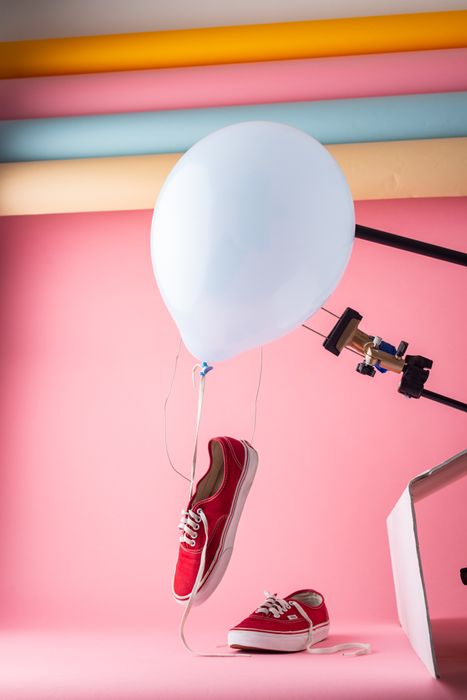
Here are some things to avoid when y'all are new to isolating a bailiwick to alter the groundwork color:
- Hair that's loose, frizzy, spiked or not smooth;
- Subjects with detailed edges;
- Annihilation with edges not in focus;
- Motion blur;
- A background that blends with the subject area.
Footstep 2: Create Two Layers
Open your photo in Photoshop and make a duplicate layer (Ctrl or Cmd +J). So turn off the original layer.
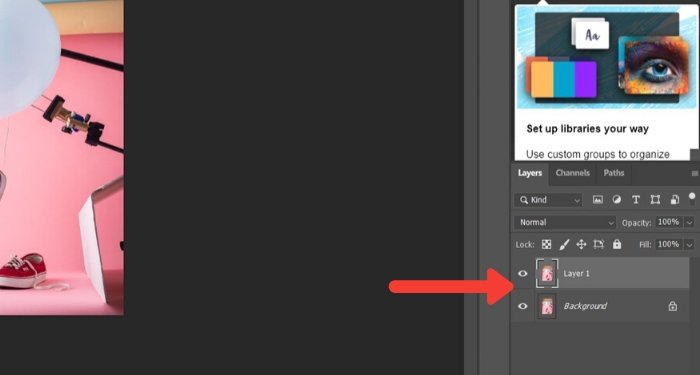
Brand a solid layer by clicking the 'Create New Fill or Adjustment Layer' icon in the 'Layers Panel'.
Choose 'Solid Color' from the top.
Option a color close to the background yous will use, or choose white.
Step iii: Select the Subject
Click on the 'Quick Choice' tool in the 'Tools Panel'. Then click on the option 'Select Subject'. It'due south in the height bar in a higher place the paradigm.
If the edges of your selection aren't precipitous, Photoshop volition let you know that it cannot discover a prominent subject. If you lot run across this, try other tools such as the 'Magic Wand' or 'Object Selection' tool.
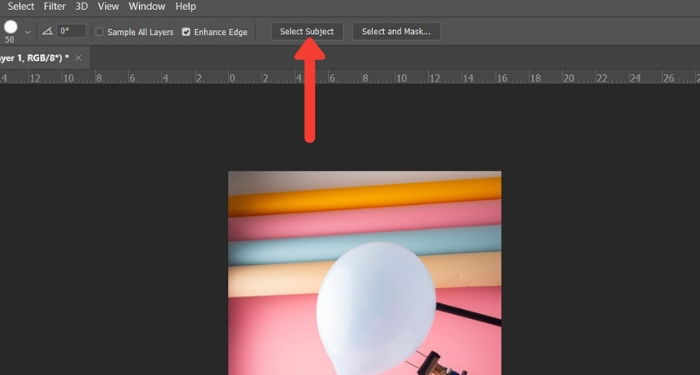
Step four: Make clean up the Edges
Unless your field of study is super precipitous, the resulting selection will not be perfect. So the next stride is to polish it.
Keep the 'Quick Selection' tool selected. And click on the 'Select and Mask' option box above your photo. Doing this opens a new window where y'all can begin to refine your selection.
Use the 'Refine Edge' brush to include edges that blend also much with the groundwork.
To assistance you meet the outcome of this brush, select either 'Overlay' or 'On White'. These options are in the 'View' panel on the right side of your screen.
Y'all can accommodate the opacity to a bespeak where y'all can see the effect of the brush as you utilize it.
Here is an example showing the 'Overlay' option from the view console at 50% opacity.
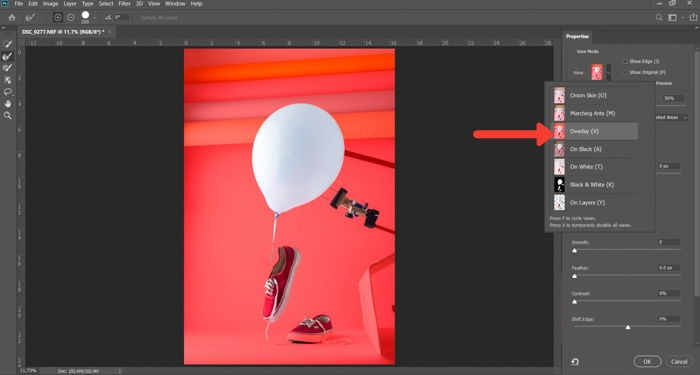
Work your fashion around the edge in a clockwise management to make sure y'all comprehend the whole outline.
You can command the size of this castor by using the [ and ] keys. You lot can also control the effect better by using the 'Radius', 'Polish', 'Plume', and 'Contrast' sliders. These are on the console at the right of your photo.
Experiment with these controls. Yous'll discover the all-time balance for the different areas of the paradigm. They volition have a varied effect depending on the detail of your photograph.
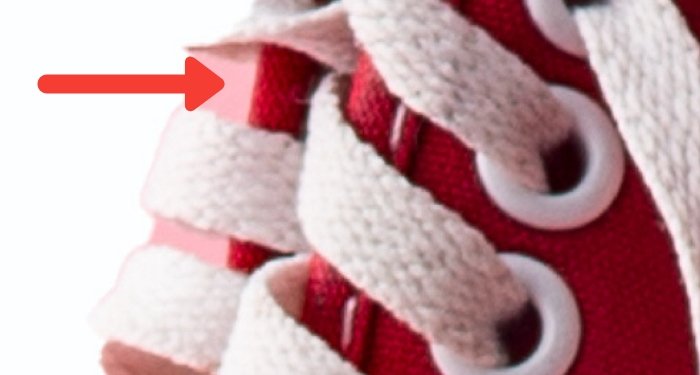
One time you lot are happy with your selection, switch the 'View' to 'Black and White'. Without the distraction of color, you tin can better see how your edges look.
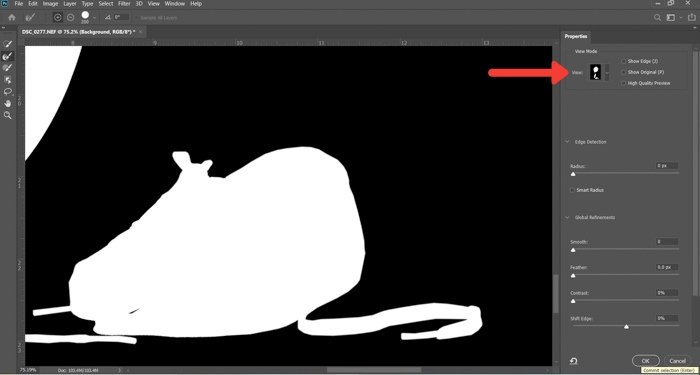
If there are no further changes to make in the 'Output To Box', select 'Layer Mask' and click OK.
Step 5: Paint on the Layer Mask
Now you have a new mask on your layer. If you want to refine the fuzzy edges further, utilise the brush tool.
Set it to 50% black, and pigment on your subject to erase and parts you lot practise not wish to see. Set information technology to 50% white, and paint over the groundwork, which is even so visible, to erase information technology.
Using the castor at fifty% or lower opacity gives yous more than precise control. Doing then helps blurred or fuzzy areas of the edges await more natural.
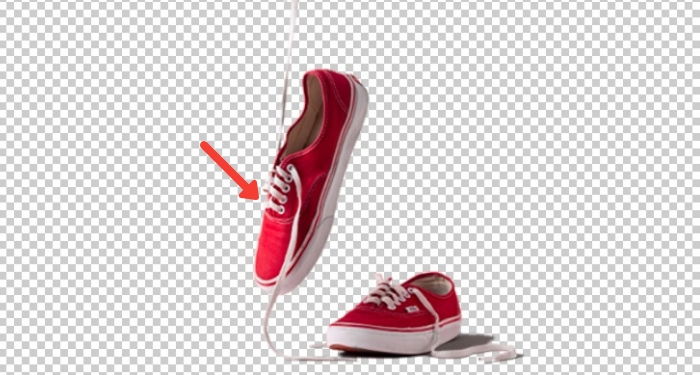
Step 6: Select and Isolate Your Field of study
Press Ctrl or Cmd and click on the layer mask to select the subject. Now duplicate the pick to a new layer using Ctrl or Cmd + J.
Hide other layers, so you lot only see your isolated subject and not the background.
In this step, you lot tin likewise resize your canvass if you wish. This step is helpful if you lot want to add some text with your photograph. Or, if you lot're going to make a composite with other images on the same background.
I chose to crop the prototype square because it looks best on Instagram. Merely yous tin can attempt other sizes, too.
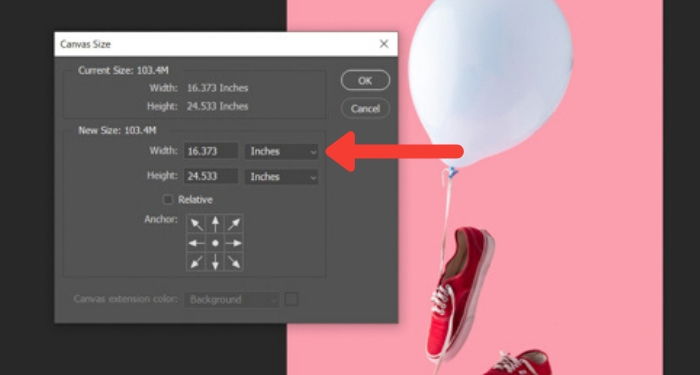
Pace 7: Make a Solid Fill for Your New Background
In the Layers Panel, click on the 'Create New Fill or Adjustment Layer'.
Select 'Solid Color' from the elevation and choose the color you desire your new background to be.

At present how exercise I alter the background colour to white in Photoshop? Simply pick the color picker, choose white, and you're expert to go!
Of course, yous don't demand to limit yourself to solid colors. You tin can endeavor a realistic background too.
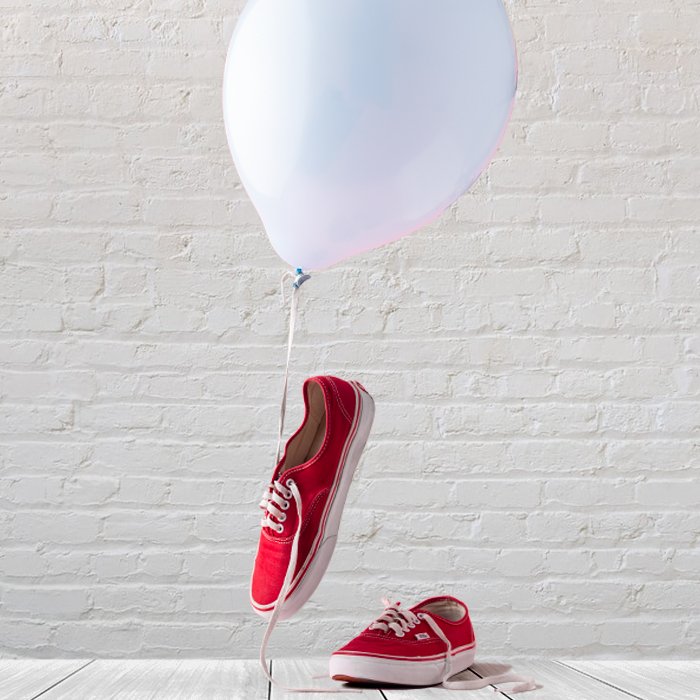
Conclusion
Changing background colour in Photoshop is a simple procedure once yous get used to it. In one case y'all isolate the subject, selecting the background color is equally piece of cake as clicking on the color picker.
Practice this method as much as you can — y'all'll discover it useful, especially on social media.
And don't forget to show united states of america your results in the comments department!
Want to acquire more about postal service-processing techniques? Check out our course Effortless Editing with Lightroom next!
Why not check our articles on best apps to add groundwork to photos or how to batch resize in Photoshop as well!
Source: https://expertphotography.com/how-to-change-the-background-color-in-photoshop/
Posted by: thompsonmecer1954.blogspot.com


0 Response to "How Do I Change Background Color In Photoshop"
Post a Comment